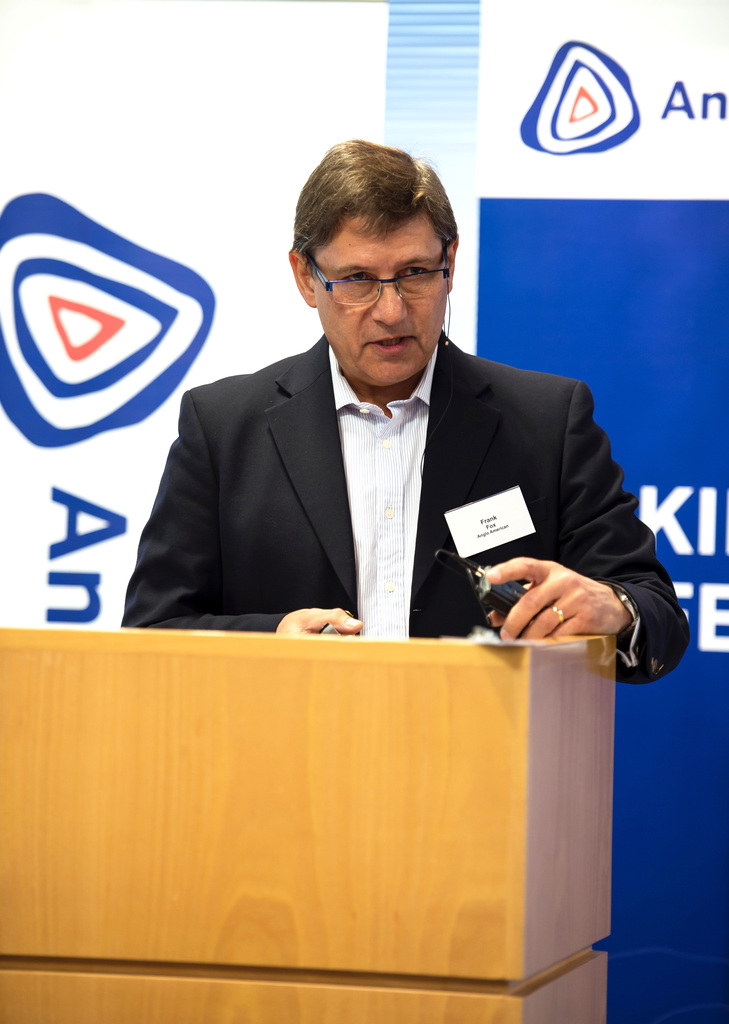
Kelly Rose
Editor

Kelly Rose
Editor
To protect the thousands of staff working across its 45 worldwide locations, Anglo American uses a site-specific approach to health and safety management that operates within a central philosophy. This devolves responsibility to the sites and the staff – from the office workers to miners.
"We don't force anybody to do anything by direct instruction," Dr Frank Fox says. "We say, 'This is what we expect you to achieve', and then we've allowed people the flexibility and freedom to develop programmes within that, guiding them and assisting them.
"It's about the policies we produce, the standards that we write, and the implementation of those standards. We have a facilitator model so it's all about persuasion and evangelism."
Preventing traditional occupational diseases is still a challenge in mining. In 2011, Anglo American introduced a standard to reduce levels of dust and prevent exposure to all inhaled pollutants. The key factors within the health standards are risk assessment, control, education and training, monitoring and review. With no one person responsible for health and safety, everyone is expected to perform a mini-risk assessment when they come into the workplace. It's called SLAM: stop, look, assess and manage.
Dr Fox says: "If you know that a machine has a control on it to manage dust, it's management's responsibility to design, implement and maintain it. But if it's not working, you have a responsibility to report that it's not working and, if it's very dangerous, not to work because you're putting yourself at risk. The idea is that everybody is responsible and everybody has to take action."
The standards for dust and noise are supported by improved health surveillance of the workforce. "Noise is our next frontier, as it is everywhere in an industrial environment and we take it for granted," Dr Fox says. Another focus is musculoskeletal strain.
Dr Fox believes employee lifestyles should be a major factor in health strategies, and Anglo American's collaborative and consultative approach has led to successful health schemes that have directly responded to specific needs.
"While we have a fundamental belief in causing 'zero harm' to our workers, we also want people to come to work and leave work in the same, if not better, condition as they started. So we have wellness programmes to identify peoples' health problems and assist in sorting them out."
Mobile health clinics, run in partnership with the Department of Health, have recently been introduced to communities in South Africa's Northern Cape, where employees operate and their families live. Visiting a number of the region's villages that have very poor health care and dispersed communities, the clinics set up a ring of caravans containing a dental unit, an eye unit and a family care unit.
Information is very important to maintaining a good health care system and in the Northern Cape town of Kathu, near the Sishen mine, the 'HealthSource' scheme – an electronic health record system – operates in a clinic run by Anglo American and the local community, and offers consistent healthcare to mobile workers in the community. The clinic provides access to voluntary counselling and treatment for HIV; it has been useful in managing the HIV programme, which is one of the company's big priorities in South Africa.
In Brazil, a programme run at an Anglo American phosphate operation, where many women work, focuses on women's health. Called the 'Flowers Programme', it has been extended into the community to include education and support for children's health issues, as well as for women in their reproductive years right through to the menopause.
Dr Fox says: "Everybody who works here is part of a community. They bring their baggage from home and the community into work and so we have to get involved in issues there."
Wellness programmes dealing with less specific issues have the potential to be rolled out across a number of sites. To increase awareness and understanding of workplace fatigue, and manage the associated risks, particularly among shift workers, South Africa's Kolomela mine has introduced the 'Safe to Work' campaign. From managing diet for night workers to educating family members about sleep loss, the programme has been deemed a success.
"It's one of our safest mines and one of our most productive mines," Dr Fox says. "That's an immediate effect in terms of worker engagement. We can show it as an example of good practice to other business units and expect them to adapt it for their particular use."
Going forward, obesity is one of the biggest challenges facing Anglo American, and programmes are up and running that raise awareness and provide the tools to manage these issues.
"We provide a healthy meal at least once a day at every site as well as guidance on how to eat well. We provide access to facilities for exercise and encourage people to get exercise – for example, our mines have sports teams. Each component is specific to the site in which it operates and has a broad central philosophy."
Since 2006, Anglo American has seen an 80% decrease in the number of new cases of occupational diseases among its workforce. There is work to be done in the coming years if it is to reach its goal of 'zero harm', but this investment is not only responsible – it's fundamental to improving business performance.
"We value our people," Dr Fox says. "As our CEO said recently: 'We don't have human resources or assets anymore. People are the business'. That's absolutely right."

